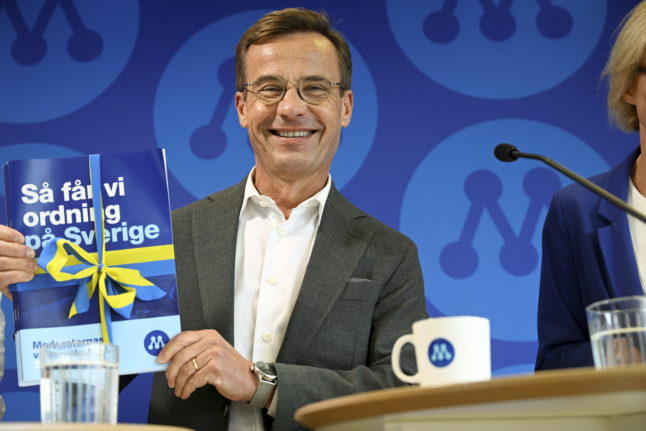READ FIRST: Moderate leader Anna Kinberg Batra resigns
You'd have to be hard-hearted not to feel even a little sorry for Anna Kinberg Batra. She stepped down today as leader of the main Swedish opposition party, the Moderates. She lasted less than three years in the job, and never got to fight an election.
Rather like another conservative leader across the North Sea, British prime minister Theresa May, Kinberg Batra was often regarded as wooden in public appearances. In previous rounds of internal party criticism, she was often accused of being “unclear”, and she duly promised at the start of June to be “clearer” (tydligare) in her leadership.
Yet precisely what she was supposed to be clearer about was rarely specified. What could “AKB” have done differently?
From bad to worse
The immediate cause of her downfall is obvious enough. Her party's support in the polls is extremely weak.
In the 2014 election, after eight years of Moderate-led coalition government, the Moderates got 23.1 percent of the vote. That was a hefty drop from its previous score, so the potential for recovery in opposition was clear. What's more, the centre-left government that took office in 2014 looked very wobbly, and nearly fell after just a few weeks. In autumn 2015 it implemented a truly spectacular policy U-turn when it abandoned Sweden's generous reception of asylum-seekers, one of its parties' most cherished policies.
Yet the Moderates' support in the opinion polls did not recover. It sunk further. The final straw for many in the party was probably a poll published last weekend in Svenska Dagbladet, which put the Moderates on around 16 percent. That came less than a month after the government had once again found itself on the brink of collapse, this time because of its handling of data mismanagement at the public Transport Agency. Yet despite this huge scandal, the poll suggested that the Moderates had barely profited.
Frustration could no longer be contained. A lone call for her to go, by an obscure local politician, snowballed this week until the extent of Moderate opposition to her made it impossible for Kinberg Batra to continue.
So where did it all go wrong for AKB?
The problem of strategy
For many media observers (some of whom may now struggle to disguise their skadeglädje, Swedish for Schadenfreude), her fatal error was to announce suddenly, in January this year, that the Moderates would no longer isolate the far-right Sweden Democrats (SD). Instead, they would explore the possibility of an understanding with SD that could underpin a Moderate-led majority government. Certainly, the Moderates immediately lost more ground in the polls, presumably due to defections from sympathisers who saw SD as beyond the pale.
However, it is not obvious that maintaining what political scientists often call the cordon sanitaire around SD would have worked any better for the Moderates. Most of their electoral losses in the 2014 election had been to SD. Some have argued that the Moderates' adoption of a much more restrictive asylum policy during the refugee crisis of 2015, and then their withdrawal from the cordon sanitaire seven months ago, actually stemmed any further losses to SD among their supporters.
It's tempting, then, to conclude that Kinberg Batra's Moderates just couldn't win. Whatever strategy they pursued was bound to cost them support – and thus undermine the leader's credibility. But that is surely too fatalist. Parties are never entirely in thrall to their circumstances. There was, in fact, one additional path that the Moderates under AKB might have taken.
Goodbye, Alliance?
In 2004 the Moderates led the formation of the Alliance for Sweden, a proto-coalition of four centre-right parties. It was enormously successful. The previously dominant Social Democrats were kept in opposition for an unprecedented eight years. Yet the Alliance has, in my view, been moribund since 2014.
Some years ago, a colleague and I wrote about this sort of proto-coalition (which had also materialised in Norway). We argued that it really matters what a party wants most at a particular moment. A necessary condition for a proto-coalition is that each of its parties must prioritise getting into government over all other goals, such as maximising its vote.
And that condition simply no longer applies to the Alliance parties. The Liberals and, in particular, the Centre Party have made it pretty clear that they would rather stay in opposition rather than enter a government that is dependent on SD for parliamentary support. That was reaffirmed following the recent Transport Agency scandal, in which the Alliance's divisions allowed the Social Democratic prime minister, Stefan Löfven, to survive and even, amazingly, to enhance his political reputation.
Given this fundamental strategic disagreement between the Alliance parties, a really bold, authoritative Moderate leader could have drawn the public conclusion that the Alliance was dead; that the party would henceforth run its own electoral race; and that it would explore the possibility of co-operation with other parliamentary parties, including SD – but only after the 2018 election, not before it.
That, at least, would surely have been a “clearer” line for the Moderates, freeing them from a hopeless balancing act between previous allies to their left and a potential one to their right. It might also have led the Moderates to concentrate more fully on their own ideas and policies, rather than the endless strategising for which Kinberg Batra was also criticised.
The scope for leadership
Realistically, though, could she have taken such a step? Again rather like Theresa May, AKB was ushered by her party into the leader's job without any other candidate being seriously considered. Her party never had a chance to express, or perhaps even to consider, what it expected of her. She never had the opportunity to explain what she planned to do as leader, or perhaps even to work out what she wanted; and she thus never got a mandate from her party to do very much at all.
Kinberg Batra inherited a limited-aggression pact with the government parties, the December Agreement, that many Moderates had deep misgivings about. She soon allowed it to collapse. But could she really have gone further and abandoned the Alliance, the key to the party's historic success under her predecessor? Had she tried, she might just have been forced out even sooner.
It may be that AKB lacked some of the personal attributes that an aspiring prime minister needs. She also faced a very challenging brief, as the whole Swedish party system struggles to adapt to SD's presence now being a fact of political life. But in allowing her such limited scope to lead her party, the Moderates did their now former leader no favours at all.
Nicholas Aylott is associate professor of political science at Södertörn University in Stockholm. Follow him here on Twitter.



 Please whitelist us to continue reading.
Please whitelist us to continue reading.